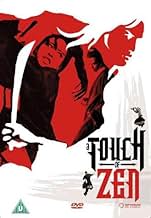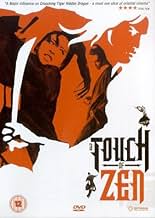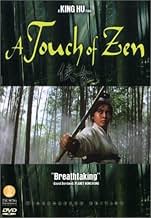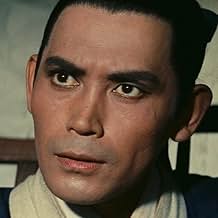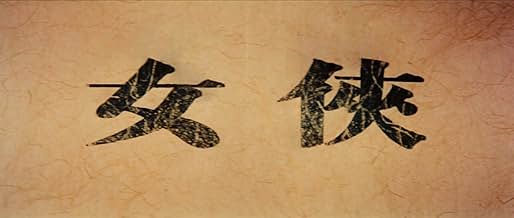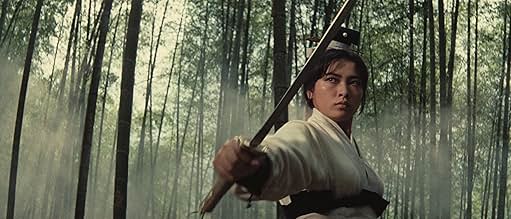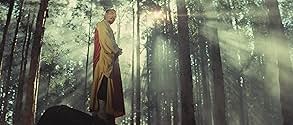Une femme fugitive fuyant des fonctionnaires corrompus du gouvernement est rejointe dans ses efforts par un peintre sans ambition et des moines bouddhistes qualifiés.Une femme fugitive fuyant des fonctionnaires corrompus du gouvernement est rejointe dans ses efforts par un peintre sans ambition et des moines bouddhistes qualifiés.Une femme fugitive fuyant des fonctionnaires corrompus du gouvernement est rejointe dans ses efforts par un peintre sans ambition et des moines bouddhistes qualifiés.
- Réalisation
- Scénario
- Casting principal
- Récompenses
- 2 victoires et 1 nomination au total
Avis à la une
Its panoramic nature sequences have not only esthetic value, but are also symbolically relevant. In fact if one wanted to do this, it would be possible to interpret the whole movie as an allegory of human existence. Fortunately there is really no need to get out the heavy guns of symbolism and artistic value to convince oneself that Hsia Nu is a great movie. It is gripping and entertaining, amusing and serious, and infused with a pathos hardly ever encountered in European (or American) movies. Pathos of course is something difficult to handle, but the director and cast of Hsia Nu manage it very well. The film has its deliberate light moments, but it never invites laughter at its moments of pathos.
Of course we are talking here about a martial arts movie. And indeed, the fighting sequences are brilliantly done - there definitely has been no progress since 1969 - but there is not only that. There is in fact not all that much fighting if one considers that this is a three hour film, and the fights do not carry the plot. In some sense Hsia Nu resembles more a Japanese samurai drama than what we more customarily associate with the Hong Kong and Taiwan martial arts genre.
The plot is very long and complex - though perfectly understandable, and even logical - therefore I do not see any real interest in retelling it here. Suffice to say that it contains most principal human emotions: loyalty and treason, love and revenge, hunger for happiness and for...enlightenment. The acting is brilliant, and especially a more masterly 'great master' character, a monk in Hsia Nu, would indeed be difficult to find in any martial arts movie.
If anybody is not convinced by the merit of the martial arts genre and just wants to give it a sole and unique chance, then this is the movie that might convinced such a snob that cinematographic 'art' is not necessarily grey, quiet and slow, but can be colourful, vibrant and full of pathos.
It is over three hours long; the first hour is mainly scene-setting and not much happens, but this just adds to the impact. All you could want in a film is here - tension, action, arty filmwork, a kind of love interest, action, beautifully choreographed fights, intrigue, action, comedy, philosophy.... and a monk who is so pure that when he is wounded he bleeds.... well, you'd better see for yourself what he bleeds.
A must-see (if you have three hours to spare).
Aside from the philosophical points, ZEN also scores strongly in establishing mood, suspense, and fascinating visuals. The Jiang Hu in this film feels incredibly authentic, and the rich mise-en-scene is refreshing compared to the limited Shaw Bros studio offerings. I loved the photography throughout; it beautifully captures the spiritual wonder of ancient Orient. In framing still shots, King Hu chiefly employs medium and medium close-ups, mounting his camera at an upward angle so we can always see beyond the characters, perhaps to suggest existence of higher wisdom.
One observation I would like to propose is that although ZEN is probably a milestone in Chinese cinema, it would be a minor masterpiece compared to the best works from 60s Japan. The lush photography and haunting images from KWAIDAN come to mind as a comparison. No doubt, King Hu also learned a few tricks from the likes of Kurosawa, such as pointing his camera at the sun which occurs frequently in ZEN.
[9/10]
The film is carefully structured, in three contrasting sections. It is only when you look back that you realize just how cleverly King Hu has created those three sections. The same characters, for the most part, appear in each section, but each focuses on a different combination. The first section focuses on the artist Ku, slowly building a picture of a quiet life in a rural backwater. The second switches tempo, with amazing martial arts action focusing on the fugitive Ku and her friends. The final section calms down again, as the mysterious Buddhist monk comes into sharp focus, and the martial arts become more and more amazing.
All this takes place in the most beautiful Chinese countryside, sometimes bathed in light (the use of sunlight and the monk is particularly impressive) and sometimes in dramatic thunderstorms, making the film even more of a delight to watch. Don't be put off by the 'kung-fu' label, this is even better than "Crouching Dragon, Hidden Tiger".
What I especially like about it is that it starts off as something totally different but eventually ends as am adventurous movie, with lots of material arts fights in it. It's a long movie (about 3 hours) so it takes its time to slowly set things up and let stuff develop into something different. This ensures that the movie is always slowly but gradually developing and also never stands still, so there is never being an actual slow moment in this movie.
As the story develops, things also definitely get more interesting and fun to watch. The movie turns into a real adventure, in which the main characters are almost constantly traveling and having encounters with people that want to take their lives. This ensures that there is also plenty of action to enjoy in this movie, involving sword fights but also plenty of hand-to-hand combat, with every now and then Wire Fu effects involved.
It's also being a real innovative and original movie at times with some of its editing and camera techniques. In that regard this is also being a real '70's flick, a period in which a lot of experimenting with editing and cinematography was going on. Especially the cinematography is great at times and also does a good job at capturing the right mood and brining the environments very lively to the screen.
It's just the sort of movie not an awful lot is being wrong with. It does everything well and within its genre it's being a great watch!
9/10
http://bobafett1138.blogspot.com/
Le saviez-vous
- AnecdotesDirector King Hu had a full village constructed for the opening half of the movie, and then left it alone for nine months to give it a weathered look.
- GaffesThe film is set in the 14th century AD. However, the Gu family have maize (corn) drying outside their house - this crop is American in origin and did not reach China until the 16th century.
- Citations
Ku Shen Chai: Have you seen Miss Yang, the lady who lives here?
General Shih Wen-chiao: No, I'm blind.
Ku Shen Chai: Forgive me.
General Shih Wen-chiao: Miss Yang and her mother are gone.
Ku Shen Chai: Mr. Shih! She said you should run for your life too. Do you know where she went?
Ku Shen Chai: I have to find her!
[Shih pulls out a sword as two soldiers fly down from the sky and attack, but are quickly killed in a few brief strokes of the sword]
Ku Shen Chai: Mr. Shih! Mr. Shih, who are you really?
General Shih Wen-chiao: I'm not blind, that's for sure.
- Versions alternativesA Touch Of Zen was originally released in Taiwan in two parts with a total running time of 3 hours 20 minutes. However, the bamboo forest sequence which ended part one was reprised at the beginning of part two, adding over 20 minutes to the total running time. When the two parts were combined by King Hu without any repeated scenes in 1975, the resulting total time was 3 hours. The 2015 4K restoration from the original negative runs 2 hours 59 minutes.
- ConnexionsFeatured in La menace (1977)
Meilleurs choix
- How long is A Touch of Zen?Alimenté par Alexa
Détails
- Date de sortie
- Pays d’origine
- Langue
- Aussi connu sous le nom de
- Les héroïques
- Lieux de tournage
- Taroko National Park, Hualien, Taïwan(monastery and river canyon)
- Sociétés de production
- Voir plus de crédits d'entreprise sur IMDbPro
- Durée
- 3h 20min(200 min)
- Mixage
- Rapport de forme
- 2.35 : 1


